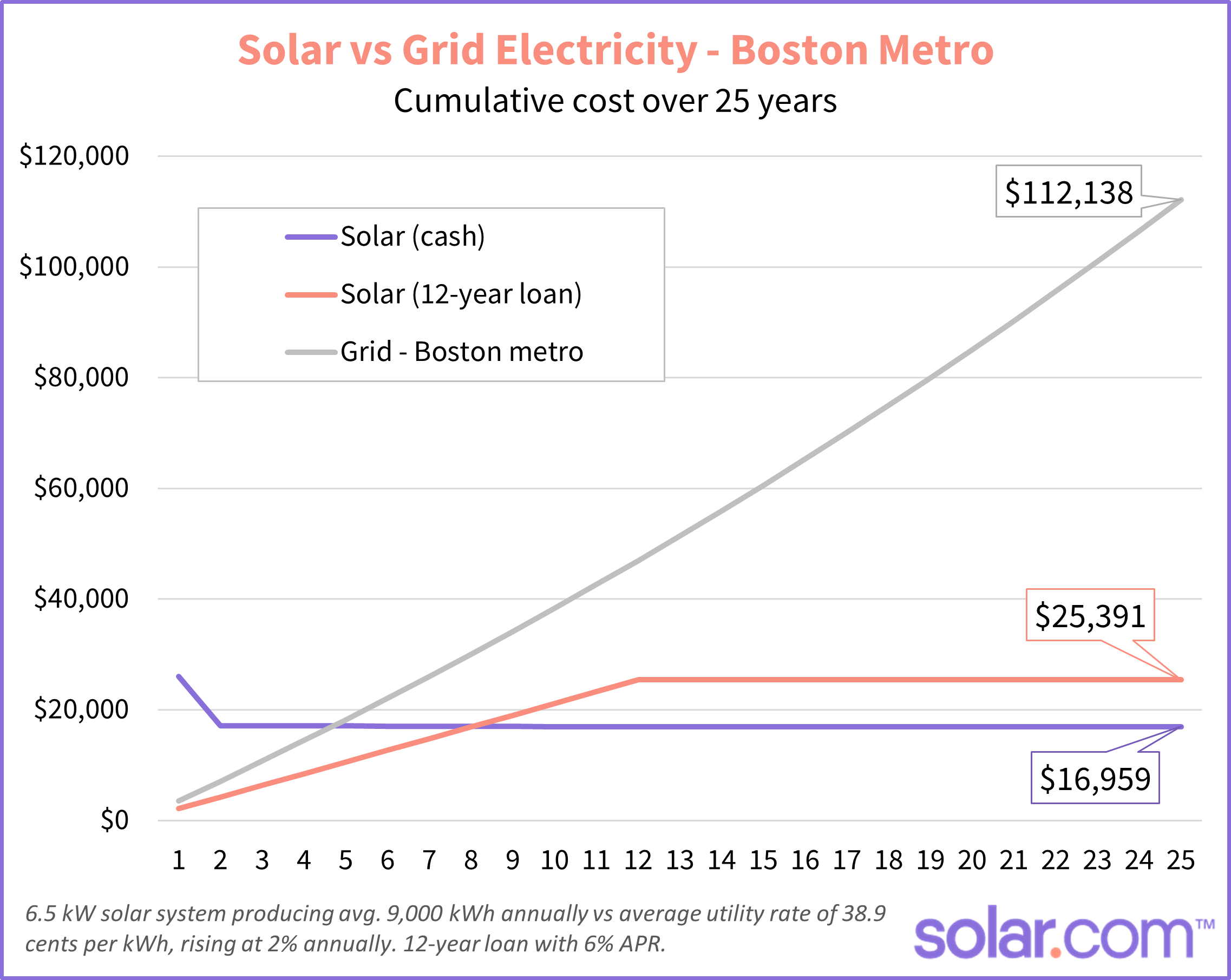5 Reasons Solar Panels Are Worth It in Boston
New England may not jump out as a premier place for solar energy, but with robust incentives and some of the nation’s highest electricity prices, there are plenty of reasons why solar panels are worth it in Boston.
The great thing about home solar is that it doesn’t matter if your primary concern is energy costs, carbon emissions, or backup power for grid outages: home solar addresses all of these issues at once.
In this article, we’ll explore five things that make solar panels worth it in Boston.
- Robust solar and battery incentives
- High grid electricity prices
- Backup power for grid outages
- Reducing carbon emissions
- Increasing your home value
Let’s dive in with a closer look at why Boston’s homeowners and businesses are investing in solar energy.
Compare multiple solar quotes from trusted local installers.
Are solar panels worth it in Boston?
Yes, solar panels are absolutely worth it in Boston – for energy cost savings and many additional reasons.
In fact, Boston’s iconic Fenway Park was the first professional baseball stadium to install solar panels in 2008. Then in 2022 the Fenway Sports Group doubled-down on solar with a 300-panel installation on the roof of the MGM Music Hall at Fenway.
If solar can power Fenway Park, then why can’t it power your home? Here are five things that make home solar wortwhile in Boston.
1) Massachusetts’ offers robust solar and battery incentives
Massachusetts offers a handful of solar and battery incentives that reduce the cost and increase the savings of solar energy.
In 2023, Massachusetts solar and battery incentives that apply to Boston include:
- A 15% state tax credit (Up to $1,000)
- A 30% federal tax credit (no limit)
- The Solar Massachusetts Renewable Target (SMART) program
- Sales and property tax exemptions for solar systems
- A strong net metering policy
We explored these incentives in depth in this article and found that an Eversource customer in Boston could reduce the cost of a solar-only system by nearly 35% and reduce the cost of a solar and battery system by 42% (thanks to the SMART program battery adder).
| 6.5 kW solar-only system | 6.5 kW solar + 10 kWh battery | |
| Gross cost of system | $26,000 | $40,285 |
| 30% federal tax credit | -$7,800 | -$12,085 |
| 15% MA state tax credit | -$1,000 (max amount) | -$1,000 (max amount) |
| 10 years of SMART compensation | -$241 | -$4,624 |
| Net cost of system | $16,959 | $23,576 |
Massachusetts also has one of the most favorable net metering policies in the country, which, as your friends in California can tell you, is worth locking-in before it goes away.
2) Boston has some of the nation’s highest electricity prices
Perhaps the greatest reason that solar panels are worth it Boston is the huge potential for energy cost savings.
At nearly 39 cents per kWh in March 2023, the Boston metro has some of the highest utility electricity rates in the country. Combined with solar incentives, sky-high utility rates make for quick payback periods for solar systems and some of the country’s best energy cost savings.
The chart below shows the cumulative cost of powering a home with a 6.5 kW solar system versus buying the same amount of electricity from a utility. Even with an extremely conservative inflation rate of 2% per year for grid electricity, home solar provides tremendous cost savings over the 25-year warrantied life of a solar system.

While home solar is a no-brainer in the long run, the average stay in a home is around 13 years. So, how long does it take for solar panels to pay for themselves in Massachusetts?
- With a cash purchase, homeowners in the Boston metro can expect a payback period of around 4-5 years
- By taking out a solar loan, Bostonians enjoy immediate savings by replacing their utility bills with a lower payment for solar panels
While taking out a loan front loads the savings, the interest payments eat in the long-term savings. Either way, solar panels are worth it in Boston for the energy cost savings alone, and it’s important to recognize that solar panels give homeowners something that utility providers can’t: Control over their essential electricity costs.
3) Backup power for grid outages
One of the most attractive aspects of home solar is the prospect of having backup power for grid outages.
In 2020, Massachusetts ranked 5th for the most major power outage events and 13th for the most outage duration hours. And in the first month of 2023, the Bay State experienced a 35-hour outage event due to a winter storm.
| State | Power outages | Power outage duration hours |
| California | 39 | 414 |
| Texas | 31 | 740 |
| Louisiana | 16 | 697 |
| Maine | 12 | 283 |
| Massachusetts | 12 | 233 |
2020 power outage data from the US Energy Information Administration.
When combined with battery storage, solar panels can power essential electrical systems like refrigeration, hot water, device charging, and Wi-Fi for several days. And, it can also help kick on a natural gas furnace, which can be a game-changer during a winter storm outage.
It’s worth repeating that the SMART program has an “adder” specifically for solar systems with battery storage that’s worth up to 4.87 cents per kWh for 10 years. that amounts to $483 per year and $4,383 over 10 years for a 6.5 kW solar system producing 9,000 kWh per year.
4) Reducing carbon emissions
Many homeowners are motivated to install solar panels by a desire to reduce their carbon emissions, contribute to the clean energy transition, and set a good example for their friends, family, and neighbors.
If that’s the goal, then solar panels are well-worth it in Boston as more than 80% of Massachusetts’ electricity was generated by burning fossil fuels in 2022. This includes the controversial Medical Area Total Energy Plant that’s entirely surrounded by hospitals and medical buildings.

The life-cycle emissions of generating electricity from natural gas is around 12 times greater than the lifecycle emissions of rooftop solar, so powering your home with solar in Boston makes a meaningful impact on your carbon footprint.
It’s also worth noting that home solar is contagious, and by installing a rooftop solar system you can increase the odds that your friends and family members will do the same, further reducing carbon emissions and improving local air quality.
5) Increased home value
The fifth reason why solar panels are worth it in Boston is increased home value. Studies by Zillow and the Lawrence Berkeley National Laboratory have shown that homes with solar panels sell faster and for more money than comparable homes without.
Given Boston’s incredibly high grid electricity prices, a home with a low, fixed electricity cost is an attractive investment – especially for millennial homebuyers that highly value eco-friendly home features.
At the end of the day, solar panels are a home improvement project just like renovating a kitchen or laying new floors. With quick payback periods for solar panels in Boston, homeowners can enjoy energy cost savings while they live in the home and see a return on their investment when it’s time to sell.
Boston is prime for home solar
From cost savings to cutting emissions, solar panels are worth it in Boston for several reasons. And it doesn’t matter if you’re laser-focused on reducing your energy costs or providing backup power for outages: a single home solar system serves many purposes at once.
Team up with an Energy Advisor to discuss your energy goals, compare multiple quotes from trusted installers in your area, and see how much you can save with a home solar system.
Solar panels in Boston FAQs
Can solar panels work with AC?
Yes, solar panels can produce enough electricity to power an air conditioning unit and are a great way to reduce your utility costs during peak pricing in the summer. There may be times when a home solar system can’t produce enough electricity to entirely power an AC, but in these instances you can pull electricity from the grid to make up the shortfall.
How long do solar panels last?
Modern solar panels are typically warrantied for 25-30 years and can last much longer. Solar panel warranties guarantee that the modules can achieve a certain level of output (usually 80-92%) after a certain period of time.
However, it’s important to note that the panels can continue to produce power well after the warranty period has expired. In fact, the first modern solar cell is 70 years old and still producing power in a museum.
Do people really save money on solar panels?
Yes, homeowners across the US save money by powering their homes with solar panels – especially after the rapid utility electricity rate hikes of 2022.
Electricity from a home solar system typically costs around 8 cents per kWh, whereas the national average price for grid electricity is around 16 cents per kWh (and well over 30 cents per kWh in Boston, San Francisco, and San Diego).








